Guide to your care







Welcome to Fred Hutch Cancer Center - Proton Therapy Thank you for placing your trust in us . We are devoted to giving you the best possible care and support throughout your time here .
We understand that choosing a cancer treatment can be overwhelming, and we put together this guide to help answer any questions you might have . Please read it, keep it as a reference, and feel free to share it with your caregiver, family and friends
When you seek treatment at Fred Hutch, you access a network of providers whose sole mission is the pursuit of better, longer, richer lives for our patients .
Your health, safety and comfort are our highest priorities .
If you have any questions at all, we’re just a click or a phone call away Contact us at (206) 306-2800 or Info.Proton@fredhutch.org .
Warmly,
 Jing Zeng, MD Medical Director
Jing Zeng, MD Medical Director
Proton therapy is a type of radiation therapy that uses beams of protons (tiny particles with a positive charge) to kill tumor cells . This type of treatment can reduce the amount of radiation damage to healthy tissue near a tumor It is used to treat cancers of the head and neck and organs such as the brain, eye, lung, spine, and prostate . Proton beam radiation is different from standard X-ray radiation .
Research shows proton therapy can minimize short- and long-term side effects, reduce the occurrence of secondary tumors and improve patients’ quality of life .
Because it can be so precisely targeted, proton radiation is especially useful for childhood cancers, where the impact of excess radiation can cause long-term damage .
How does proton therapy differ from standard X-ray radiation?
The biggest difference between proton therapy and standard radiation is that standard radiation uses X-rays to deliver radiation to the tumor and beyond it . This can cause damage to nearby healthy tissues .
Proton radiation delivers a beam of protons that stops at the tumor . This reduces the amount of radiation to healthy tissue near the tumor .
See the images below for detail .
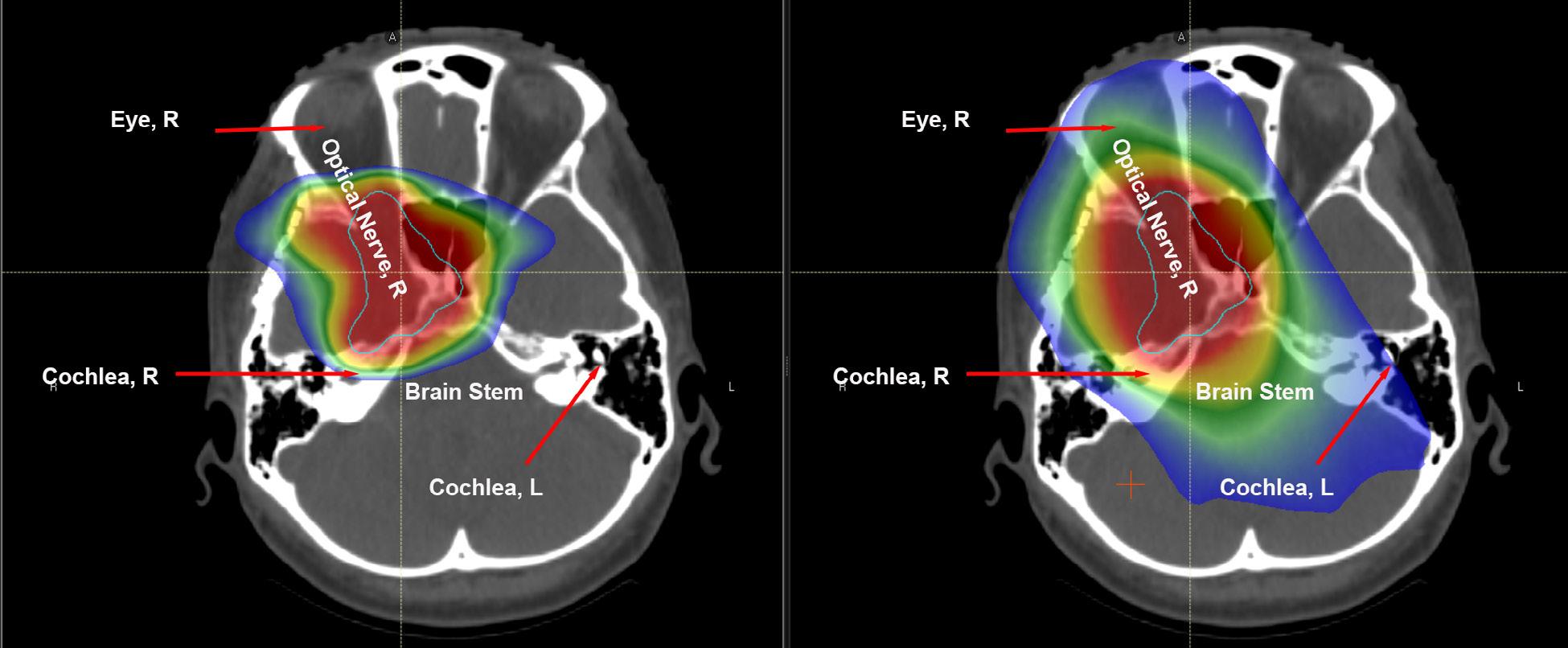
Proton therapy is safe, noninvasive and painless for most patients It does not require an overnight stay in the hospital . Treatments are usually given five days a week, for a period of one to nine weeks . The total number of treatments needed depends on the location and size of the tumor . Daily treatment sessions may last up to 30 minutes . Most of that time is spent making sure you’re in the right position for treatment . The radiation therapy typically lasts just a few minutes .
Studies have shown proton therapy can help treat a broad range of tumors, including those of the brain, central nervous system, gastrointestinal tract, head and neck, left breast, lung and prostate, as well as sarcomas (tumors in the bones and soft tissues) .
Protons are heavy charged particles that can be manipulated to release their energy at a precise point . The more energy, the deeper the protons can penetrate into the body . The amount of proton energy is calculated to release the proton radiation precisely at the tumor site The peak of this radiation dose (called the Bragg Peak, named after William Henry Bragg, who discovered it in 1903) is designed to conform to the shape of the tumor . Immediately after that point, the radiation dose falls to zero .
You can find information on disease-specific conditions and proton therapy, as well as many disease-specific resources, at fredhutch.org/protontherapy.
Many U S insurance providers, including Medicare and many state Medicaid programs, cover proton therapy treatments .
Before your first consultation, we will confirm your benefits and coverage . We will also find out if your insurance provider requires authorization for treatment . If it does, we will request it after your doctor confirms you are a candidate for proton therapy . Please note that authorization can take up to two weeks
After your insurance carrier makes a decision, your patient care coordinator will contact you to discuss next steps . You can check in with your patient care coordinator to find out the status of the request at any time; however, we will contact you once we have received the decision .
Your patient care coordinator, who is also a financial counselor, will help you understand your insurance benefits and provide you an estimate of your cost responsibility before your first treatment .
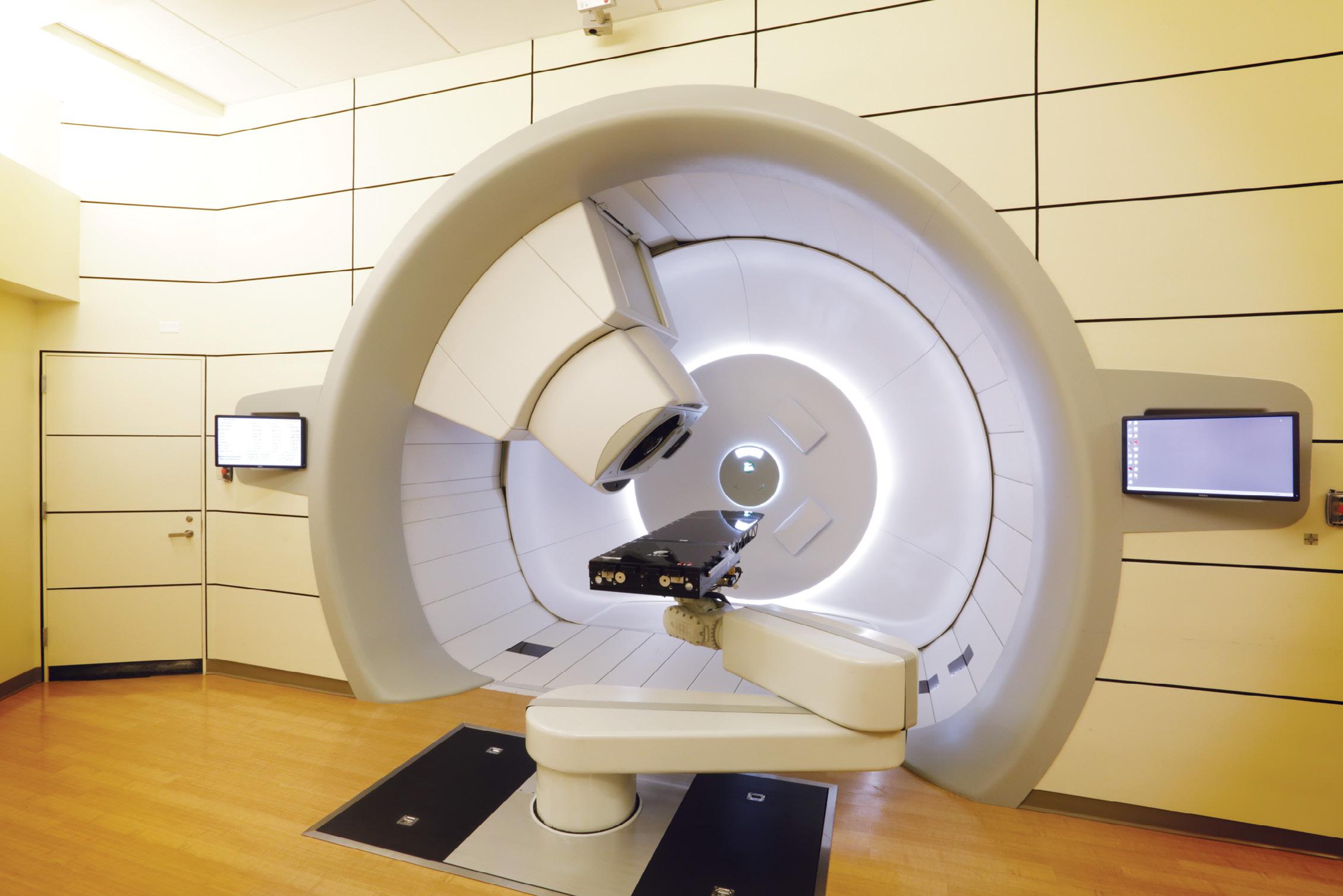
During your treatment, our patient navigator/concierge team is here to help with your non-medical needs . They are available Monday through Friday, 7:00 a .m . to 5:00 p .m . via Concierge.Proton@fredhutch.org or (206) 306-2028.
Our team’s goal is to make your time here as stress-free and comfortable as possible . They can connect you with:
• Places to stay, transportation, directions, and activities
• Networking opportunities for you and your family
• Support groups and programs, such as becoming a patient advocate
• Child life specialists, who help children undergoing treatment understand the treatment process and offer emotional support and more . Learn more at fredhutch.org/pediatric-proton-therapy.
• Patient care coordinators, who can help with any questions about your insurance or other financial needs
Other features at Fred Hutch include:
• Free parking once treatment begins
• Easy check-in using a patient ID badge
• Comfortable gowns and robes for patients with cancers below the neck
• Open layout with natural light throughout
• Free beverage bar
• Free Wi-Fi access Network: Guest-PPTC
Password: Protons4U
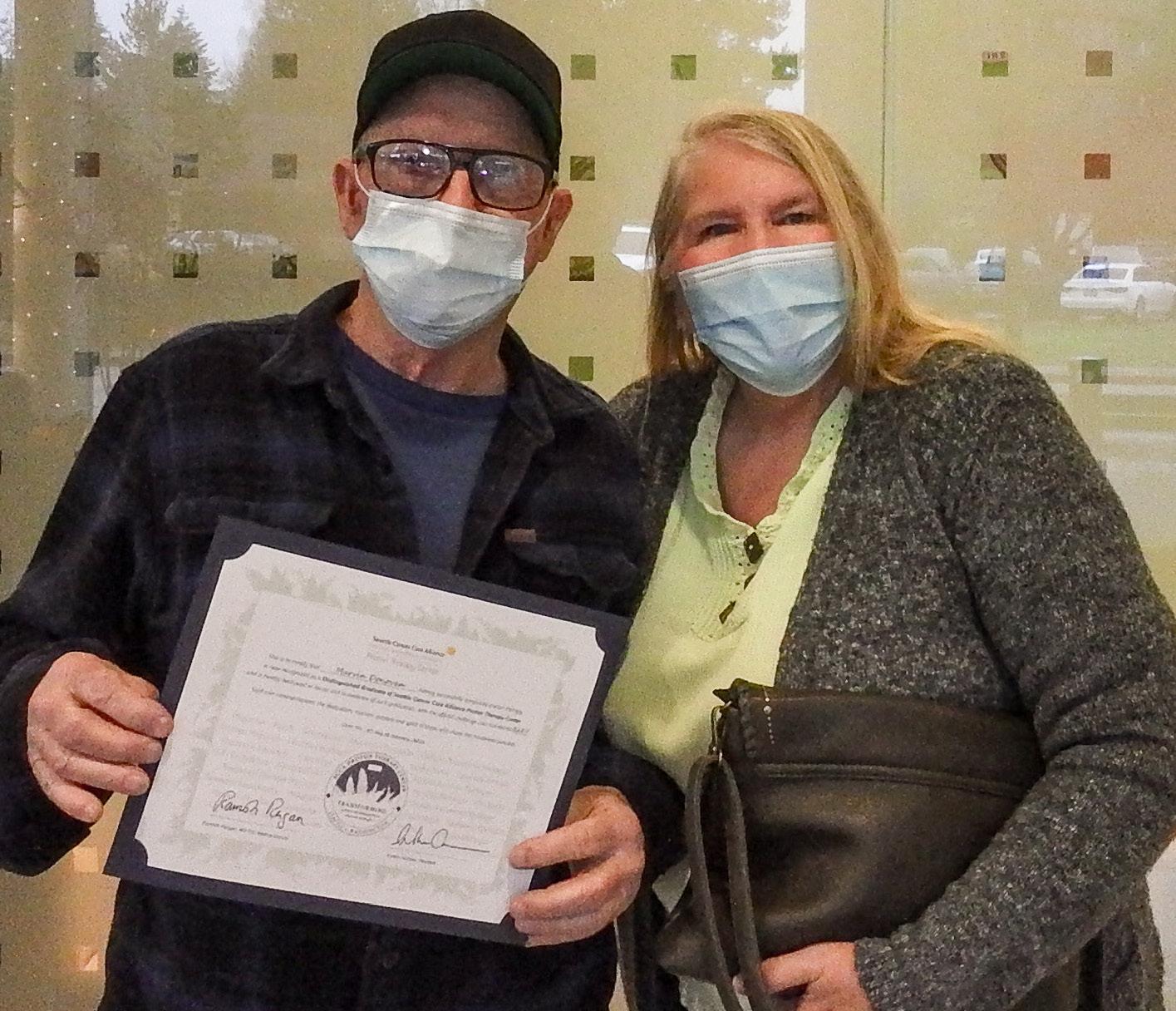
Many of our patients find comfort in connecting with other patients and families . Below are some of the ways we help people come together .
Patient advocates
Patient advocates are people who have been treated with proton therapy at Fred Hutch and are eager to offer their support and share their stories . If you’d like to talk to a patient advocate, please let our patient navigator/concierge team know . When you have completed treatment, you will have the opportunity to become a patient advocate yourself
Patient graduation
We celebrate each patient’s final treatment with a graduation ceremony . Patients receive a diploma and a challenge coin, and can also choose to ring the bell in the lobby to celebrate!
Virtual support groups
We offer two monthly support groups that are open to prospective, current, and former patients and caregivers . The Prostate Cancer Support Group shares resources about proton therapy and provides a space for discussion about prostate cancer and treatment . The Guided Meditation group helps manage stress and promote wellbeing through meditation practices . Each of these groups meet virtually . If you would like to participate, please ask the patient navigator/concierge team .
Facebook and Facebook support group
Fred Hutch - Proton Therapy has a public Facebook page (facebook.com/ fredhutchprotontherapy) that shares updates about the facility, wellness information, industry news and more . Fred Hutch also has a private Facebook group, which is available to patients who are undergoing or have undergone treatment . This closed group is a place for patients to share information or updates with other patients, ask questions or to get to know each other . Please ask the patient navigator/concierge team for the links to our Facebook pages .
Read our newsletter
Each month we produce a newsletter with provider profiles, news from our proton facility, nutrition information, patient stories, and more . Ask the Patient Navigator/ Concierge team to add you to the mailing list, or visit this link to sign up for the newsletter: bit.ly/protonnewsletter.
Expected time is 3–4 hours
Meet with patient navigator/ concierge team (15 min .)
Nursing assessment (30 min )
Physician consultation (1 hour)
Expected time is ~2–3 weeks
Treatment plan goes though a series of steps to make sure it is accurate CT simulation is used to create your treatment plan
We will call to schedule your treatment (~1-2 weeks)
CCT simulation (1–2 hours)
Arrive for your first day of treatment
Please note: You may have additional appointments at Fred Hutch or UW Medicine before you start treatment . If you have any questions during this time, or if you haven’t received any updates, please contact our patient care coordinator team at (206) 306-2800 or Access.Proton@fredhutch.org .
Before you start proton radiation therapy at Fred Hutch, you will have a consult, which may include additional tests before you move on to treatment planning . Please read below to learn about these steps and more .
During your first consult at the proton therapy facility, you will meet with your doctor and nurse . They are members of your personal care team, which also includes the radiation therapists Your personal care team will remain mostly the same throughout the course of treatment at Fred Hutch, and will remain involved in your follow-up care (see page 22 for a list of care team members) .
Before treatment begins
Before treatment begins, your doctor may decide that more tests are needed to plan your treatment, such as blood work, magnetic resonance imaging (MRI), or positron emission tomography (PET) scans . Your nurse may be able to help you schedule any additional tests .
Our patient navigator/concierge team will give you an ID badge to wear each time you visit Fred Hutch . When you arrive for treatment, we will hand you your badge and notify your treatment team that you are ready for your appointment .
After your consult and any additional tests, you will have a computed tomography (CT) simulation scan at the proton facility . This will take up to two hours, including preparation time . During this time, your nurse will explain the treatment process and give you time to ask questions .
The purpose of this scan is to gather images of your tumor and normal tissue from many angles so your doctor and dosimetrists can plan your specific treatment and make sure you are positioned correctly in the machine during your upcoming proton therapy . To help with positioning, they may use special immobilization devices such as masks, leg molds, head rests, sponges, and pillows that are customized for your body .
Depending on the location of your tumor, you may receive a contrast agent, or dye, before your CT scan so the tumor is easier to see . The dye may be injected through an intravenous (IV) line, taken orally (by mouth) or given through a catheter .
About 1–2 weeks after your CT scan, your scheduler will call you to let you know how many treatments are prescribed and schedule your first appointment .
Most patients have therapy five days a week (excluding weekends and holidays) for one to nine weeks, depending on the total number needed .
A number of factors impact scheduling, including the time required to set up equipment, the need to prioritize morning appointments for pediatric patients who can’t eat or drink before treatment, and staffing levels . Because of this, you will likely be offered only one or two appointment times for each visit We will do our best to accommodate you, but please know that due to these complexities, available appointment times are limited .
During your treatment sessions
When you arrive for your treatment, you will be greeted by a member of your care team . You may be asked to change into a gown, robe and slippers provided by Fred Hutch . There are secure lockers for you to store your clothing or other personal belongings
When you are ready, you will be walked to the treatment room where you will lie on a treatment bed or sit in a treatment chair, and your radiation therapists will position your immobilization devices properly . You will be automatically moved into position before each treatment using a robotic positioning system .
During the actual treatment, you will not feel or see the proton beam . You may hear some clicking from the equipment around you, but after a few treatment sessions patients typically stop noticing the sound . Your radiation therapists will need to leave the room at that time, but they will watch you through a video monitor . They will remain close by and can easily talk to you .
The entire session will take about 30 minutes . No recovery time is needed, and you may immediately return to your normal daily activities .
At times throughout your treatment, your attending doctor may order a Quality Assurance Scan (QA scan) . This will typically be added just before or after your daily treatment based on the availability of the CT machine . The QA scan is compared to your original CT scan to ensure that the current treatment plan is still performing as expected . It is
common for the QA scan to show slight changes in the plan or anatomy, in which case the doctor will adjust the treatment plan as needed .
Once a week (or every five treatments), you will have a meeting, called an on treatment visit (OTV), with your radiation oncologist to discuss how your therapy is going . This is a good time to ask any questions you may have . In some cases, your doctor may order additional tests such as blood tests, CTs, MRIs or other scans . We do our best to schedule your OTVs around treatment sessions, so there is no need to make an extra trip to Fred Hutch
An additional scan will be performed before you come back to Fred Hutch for your follow-up appointment, usually three months after your treatment is complete .
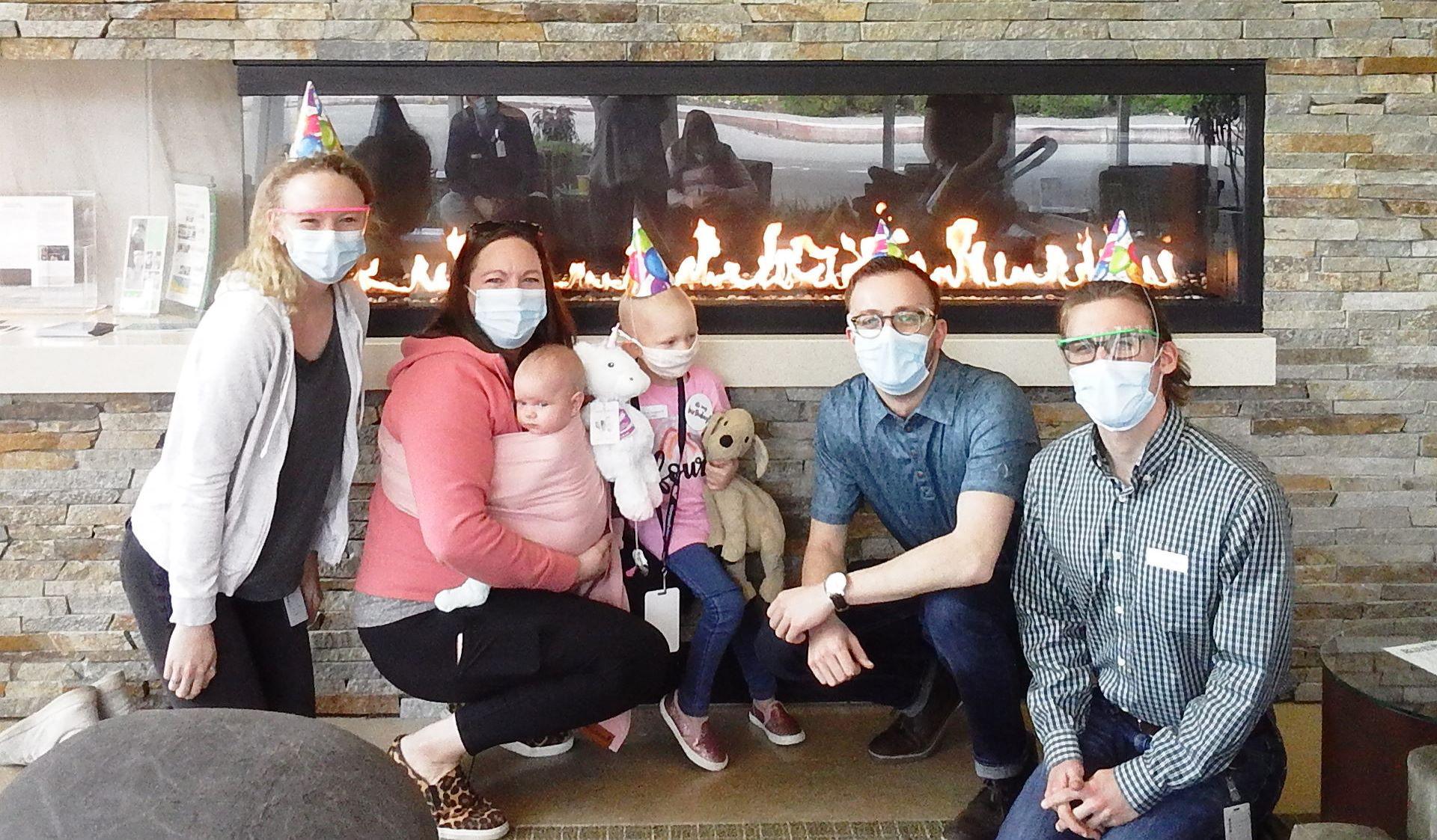

Dr . Zeng is the medical director at Fred Hutch Cancer Center - Proton Therapy and a board-certified radiation oncologist who specializes in treating lung cancer and prostate cancer . Dr . Zeng is a Professor of Radiation Oncology at the University of Washington School of Medicine and helps develop clinical and research initiatives exploring the application of proton therapy in cancer therapy .
Dr . Zeng earned her medical degree at Duke University, completed her residency in radiation oncology at the Johns Hopkins Hospital, and was involved in clinical research and translational lab research throughout .
Dr . Zeng’s research involves finding different medicines that minimize side effects of radiation treatment She is also studying new technologies to make radiation delivery safer and more accurate .
Your radiation oncologist is the leader of your personal care team at Fred Hutch and will manage your care with the support of other highly skilled medical professionals trained in providing proton therapy . They will meet with you once a week to review your progress and discuss any questions or concerns you may have . All of our physicians are specialists in proton therapy and treat all disease types .
The radiation oncologists who provide clinical care at Fred Hutch are all members of the UW Physicians Group and hold faculty positions within the UW School of Medicine . Having trained at some of the best cancer centers in the country, including UW Medicine, Harvard, Cornell, MD Anderson, Stanford, Georgetown, Johns Hopkins and Memorial Sloan-Kettering Cancer Center, they are leaders in their field and known for clinical excellence . With specializations in brain, head and neck, breast, lung, gastrointestinal, genitourinary, prostate and childhood cancers, our physicians have the expertise to provide the highest level of medical care to our patients .
All of our physicians are specialists in proton therapy and treat all disease types .

Dr. Jing Zeng
Medical Director
Specialty: Thoracic and genitourinary cancers
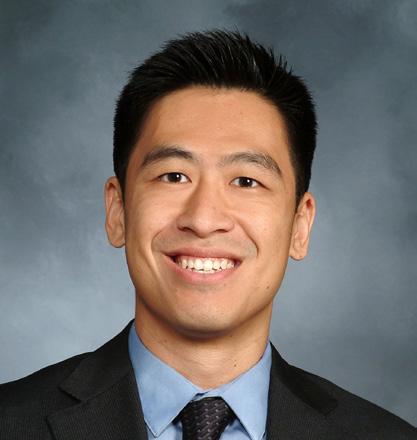
Dr. Jonathan Chen
Specialty: Ocular and prostate cancers

Dr. John Kang
Specialty: Lung and thoracic cancers

Dr. Emily Weg
Associate Medical Director
Specialty: Genitourinary cancers

Dr. Ralph Ermoian
Specialty: Childhood cancers
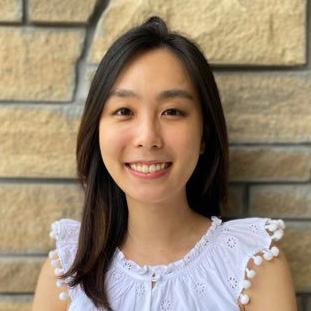
Dr. Kylie Kang
Specialty: Breast cancer

Dr. Jim Apisarnthanarax
Specialty: Gastrointestinal tumors

Dr. Lia Halasz
Specialty: Brain/ Central Nervous System (CNS) cancers

Dr. Ed Kim
Specialty: Gastrointestinal and soft tissue cancers

Dr. Janice Kim
Specialty: Breast cancer
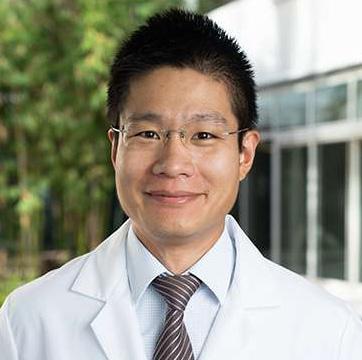
Dr. Martin Ma
Specialty: Prostate cancer

Dr. Ramesh Rengan
Past Medical Director
Specialty: Lung, ocular and prostate cancers and melanoma

Dr. Jay Liao
Specialty: Head and neck tumors and genitourinary cancers
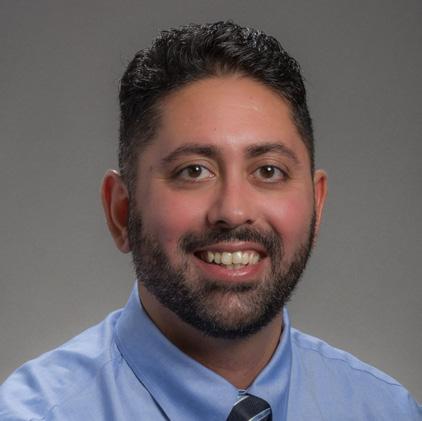
Dr. Neil Panjwani
Specialty: Head and neck tumors

Dr. Stephanie Schaub
Specialty: Sarcoma of adult and pediatric patients

Dr. Simon Lo
Specialty: CNS cancers

Dr. Upendra Parvathaneni
Specialty: Head and neck tumors

Dr. Yolanda Tseng
Specialty: CNS cancers and lymphoma



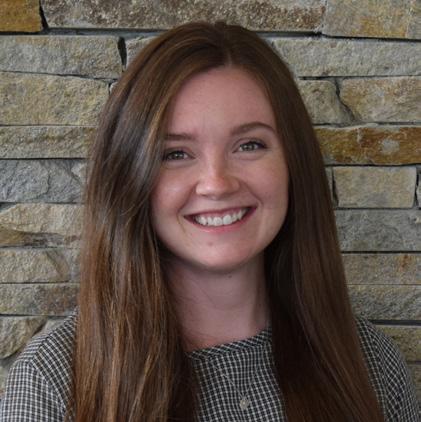


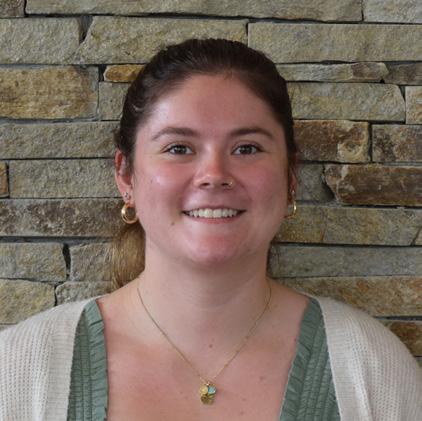
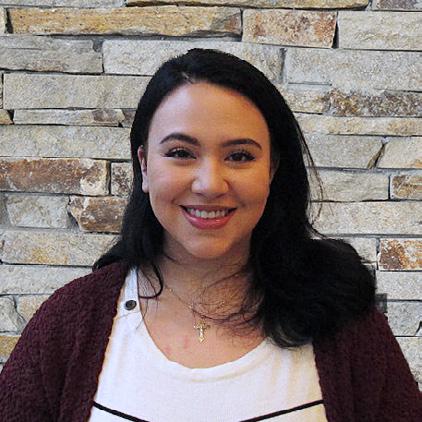

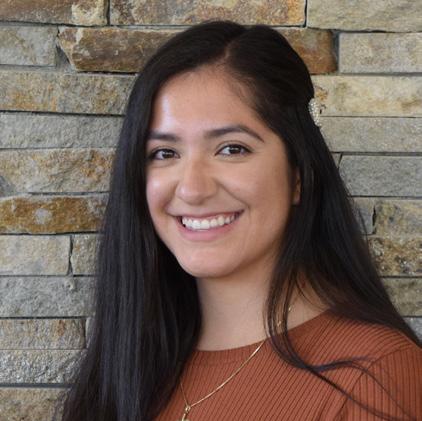

 David Astaphan, PA-C
Layne Chapple, ARNP
Jen Flannery, PA-C
Cassidy Dept . Manager
Rachelle Appeals Coordinator
Matt Supervisor
Candice Patient Care Coordinator Lead
Christine
Eric
Jaemy
Jennette E .
David Astaphan, PA-C
Layne Chapple, ARNP
Jen Flannery, PA-C
Cassidy Dept . Manager
Rachelle Appeals Coordinator
Matt Supervisor
Candice Patient Care Coordinator Lead
Christine
Eric
Jaemy
Jennette E .

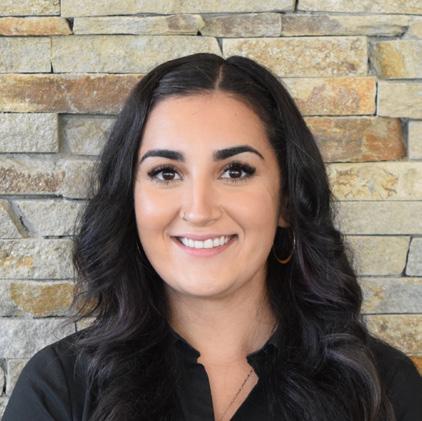

Support Staff SupervisorTeam Coordinator


Coordinator

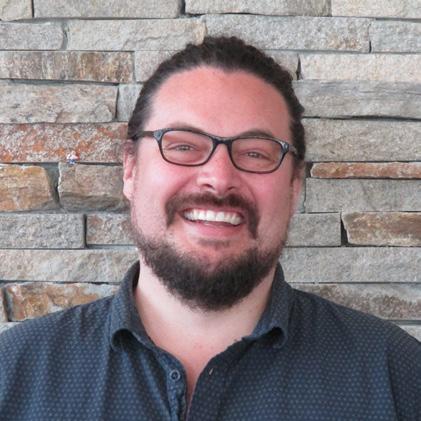 Dana
Jenny Team
Tina Team Coordinator
Morgan
Vandela
Phuong
HIM Specialist Lead
Ryan
HIM Specialist
Dana
Jenny Team
Tina Team Coordinator
Morgan
Vandela
Phuong
HIM Specialist Lead
Ryan
HIM Specialist

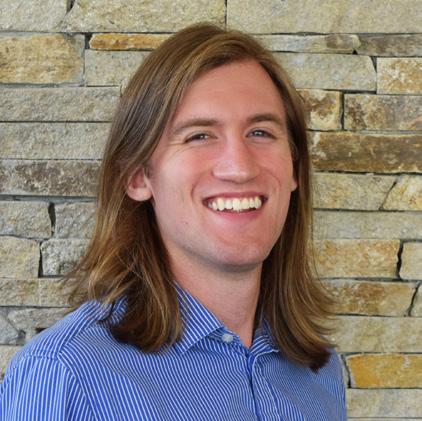




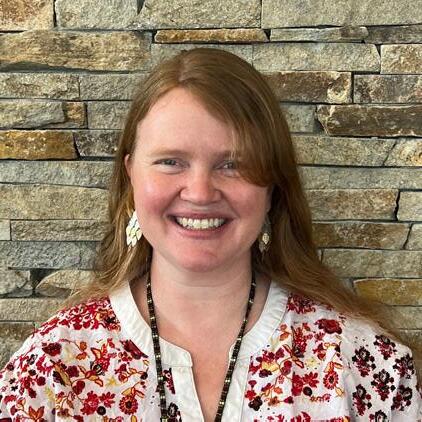
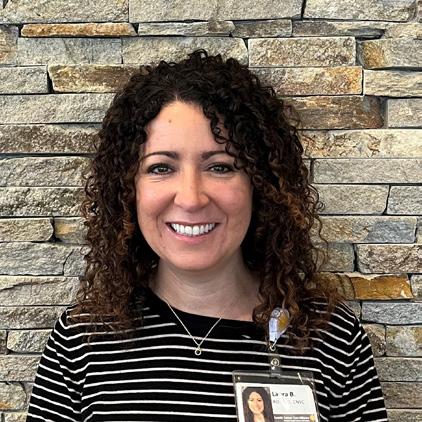

 April Dept . Manager
Ian Patient Navigator/ Concierge Lead
Annie Patient Navigator/Concierge
Gill Patient Navigator/Concierge
Katie Patient Navigator/Concierge
Chris Program Dept Coordinator
Elizabeth Social Worker
Laura Nutritionist
Brooke Child Life Specialist
April Dept . Manager
Ian Patient Navigator/ Concierge Lead
Annie Patient Navigator/Concierge
Gill Patient Navigator/Concierge
Katie Patient Navigator/Concierge
Chris Program Dept Coordinator
Elizabeth Social Worker
Laura Nutritionist
Brooke Child Life Specialist








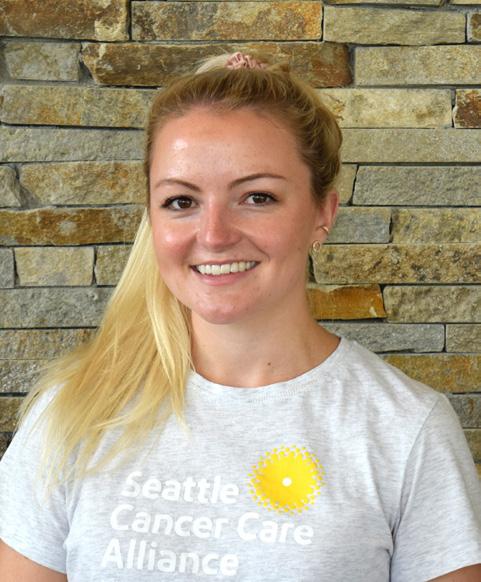

 Amanda N . Dept Manager
Micah Charge Nurse
Sita Medical Assistant
Amanda L . Angelle Betty
Debra
Jade Jordan
Amanda N . Dept Manager
Micah Charge Nurse
Sita Medical Assistant
Amanda L . Angelle Betty
Debra
Jade Jordan

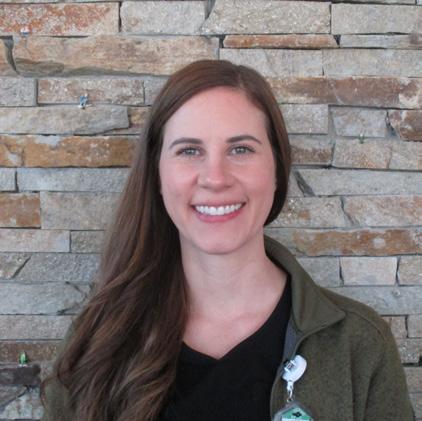

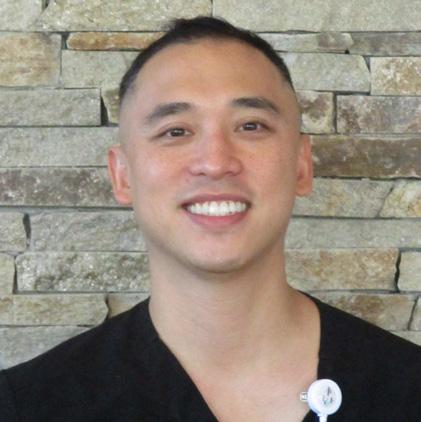
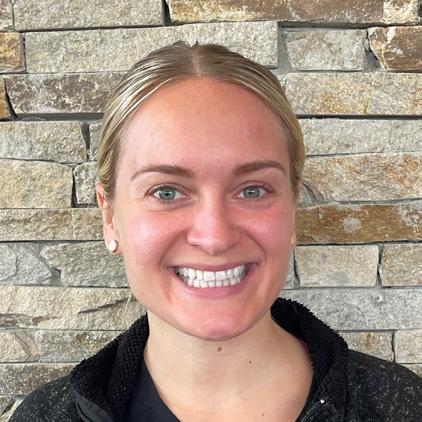






 John Manager
Aja
Ivana
Jilian Kat Kate
Katelyn
Nely
Nicole
Ruben
John Manager
Aja
Ivana
Jilian Kat Kate
Katelyn
Nely
Nicole
Ruben

• Care team nurses provide day-to-day care and help coordinate any additional medical services you might need during your proton treatment, including arranging for blood tests, scans, medical appointments or other services . Your care team nurse is a registered nurse with experience in radiation therapy .
• Radiation therapists make sure you are positioned comfortably and correctly . They will deliver your daily treatment and remain close by while you receive therapy
• Radiation oncologists direct your care and meet with you once a week to review your progress and discuss any questions or concerns you may have .
• Child Life specialist is a skilled and caring pediatric health care professional who helps you and your child understand proton therapy by using language and visual aids they understand They also teach methods to help young patients relax, express their feelings, and understand medical procedures .
• Patient care coordinators coordinate the exchange of records, collect information for evaluating your individual care, and schedule your consult . They also help you with insurance, Medicare or Medicaid coverage, and coordinating payments .
• Patient navigator/concierges provide concierge-type service from the time before you arrive at Fred Hutch to the end of your treatment .
• Treatment coordinators schedule your CT simulation appointment, treatment plan and weekly visits with your radiation oncologist .
• Medical physicists monitor the equipment and procedures used in therapy to make sure radiation is delivered safely and effectively . They run checks on your treatment plan to make sure the correct dose of protons targets your tumor
• Medical dosimetrists work with your doctor to prepare your treatment plan . They calculate the angles and doses of proton energy required to treat your tumor, while ensuring your healthy tissue is exposed to as little radiation as possible . They work closely with the radiation therapists throughout your course of treatment .
• Machinists create custom treatment devices that are used for certain patients
• Engineers monitor and ensure the system and equipment output is accurate and precise .
• Administrative staff manage office and business functions and help with your insurance claims .
• Facilities staff maintain the building and ensure it is clean and safe for our patients .
Concerns:
If you have any concerns, please call us at (206) 306-2800 or report your concerns to any member of your care team .
Clinical issues/questions (including questions about side effects):
During business hours (7 a.m.–5 p.m.):
Call your nurse first at their direct number, or call (206) 306-2803.
If they are busy, please leave a voicemail and they will return your call or have your doctor contact you as soon as possible .
After hours and weekends:
• Call (206) 598-6190.
• Urgently need to speak to your doctor? Call (206) 598-6190 and ask to have the radiation oncologist-oncall paged .
• If you’re able to wait, leave a message for your nurse anytime and your call will be returned the next business day .
Prescription refills:
Ask your pharmacy to fax a refill request to (206) 417-0467. Your nurse will work with the pharmacy to have your prescription refilled . If you need a pain medication prescription refilled, contact your care team directly .
Scheduling issues/questions:
Day of your appointment:
Call your treatment room as soon as possible if you are unable to keep an appointment or will be late .
Treatment Room 1: (206) 306-2852
Treatment Room 2: (206) 306-2850
Treatment Room 3: (206) 306-2848
Treatment Room 4/Gantry: (206) 306-2846
In general:
Speak to your treatment team . They are responsible for the treatment schedule and will try their best to accommodate your scheduling preferences . Always ask if you are unsure about a treatment time
Transportation or lodging information:
Please contact our patient navigator/concierge team at (206) 306-2028 or Concierge.Proton@fredhutch.org.
Financial/insurance questions:
Your patient care coordinator, who is also a financial counselor, can help you understand your insurance benefits . Before your first treatment, your patient care coordinator will give you an estimate of the amount you’re responsible for . If you have questions, please call (206) 306-2800.
Billing information:
Fred Hutch bills your care in two parts: a physician fee and a facility fee .
• Facility fee: When you receive proton therapy treatments at Fred Hutch, you will receive a bill for a facility fee for the equipment and supplies used to deliver your treatment . This may include charges for equipment used in the delivery of proton therapy, supplies and scans . You will receive a separate bill from UW Physicians for physician services . Clinic and facility charges may be greater than the charges for professional services, depending on the service provided
For all questions regarding your facility fee bill, or to make payments, call Fred Hutch Billing at (206) 606-6226 or email ptacct@seattlecca.org.
• Physician fee: Fred Hutch uses UW Physicians (UWP) for our professional services .
After a visit to the proton therapy facility, you will receive a bill from UWP for the professional services provided to you by or under the supervision of the attending physician This charge covers outpatient clinic services provided by or under the supervision of your physician .
For questions about your UWP bill or to make payments, call UWP at (206) 543-8606 (option 0) or the toll-free number at (888) 234-5467 (option 0) .
Interpreter services
Please let us know if you will need an interpreter for your appointments at SCCA clinics . We can arrange for specially-trained medical interpreters for patients or family members who do not speak English
If you have questions, phone (206) 606-6419.
Fred Hutch Cancer Center - Proton Therapy
1570 N . 115th Street, Seattle, WA 98133 | (877) 897-7628
FredHutch.org/protontherapy
PROT-0124-00196 | 05/22/2024